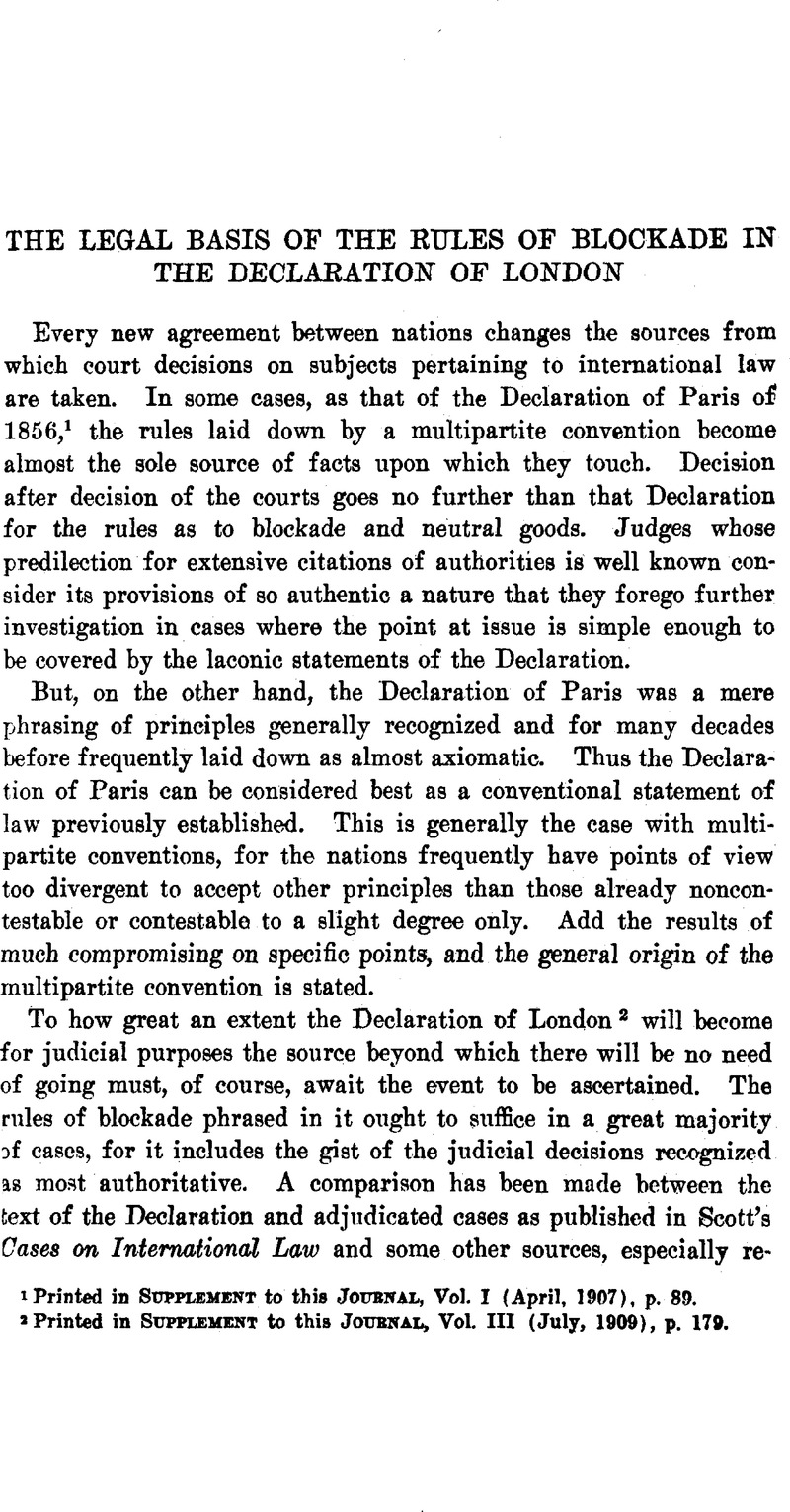Published online by Cambridge University Press: 04 May 2017

1 Printed in Supplement to this Journal, Vol. I (April, 1907), p. 89.
2 Printed in Supplement to this Journal, Vol. Ill (July, 1909), p. 178.
3 See Journal, 5:235.
4 Scott’s Cas. 796-811.
5 Compare these state laws on the subject: France, 1838 and July 25, 1870; United States, May 24 and December 24, 1846, Seward’s despatch. May 2, 1861, McKinley, April 22, 1898, 19 Richardson’s Messages and Papers, 202; Denmark, February 16, 1864; Prussia, June 20, 1864; Turkey, May 3, 1877.
6 Int. Law, Wilson and Tucker, 316.
7 Journal, 1:56-57.
8 The French doctrine of special notification was adopted by the Council of State, is embodied in treaties and is expressed in the Instructions of July 25, 1870: “Si la France l’a (la notification spéciale) érigée en principe et s’y est toujours conformée, cela lui fait beaucoup d’honneur, car l’avertissement spécial amoindrit toujours les inconvénients de la guerre pour les neutres et coupe court à tous les abus du droit de blocus.” Italy, by the Order of June 20, 1868, art. 7, and Sweden, by the Order of April 8, 1854, art. 4, admitted the necessity of special notification.
9 See Treaties in Force, 1904, pp. 94, 111, 200, 398, 419, 453, 647, and 760.
10 The text of the article here given is that of the Italian treaty. The text is to the same intent to the “unless,” from which for a few lines the following variations occur: Bolivia, “unless, after warning of such blockade or investment, from any officer commanding a vessel of the blockading forces, they shall again,” etc.; Brazil, “unless, after warning of such blockade or investment from any officer commanding a vessel of the blockading forces, she shall again,” etc.; Colombia, “unless, after warning of such blockade or investment, from the commanding officer of the blockading forces, she shall again,” etc.; Haiti, “unless, after notice of such blockade or investment, she shall again,” etc.
11 Added here in the treaty with Haiti is the phrase, “provided the same be not blockaded, besieged or invested.”
12 The treaties with Bolivia, Colombia, and Haiti end here. The treaty with Brazil continues in the words of the treaty with Italy, which is quoted above textually, except that the phrase “the port” is employed instead of “any port,” probably a change due to the translator only.
13 See ante under Article 16.
14 See U. S. Foreign Relations, 1905, 867-874. The Japanese minister in a memorandum of November 9 inquired of Secretary Root as to the validity of treaties negotiated by Sweden and Norway previous to their separation on June 7 as to other Powers and toward each severally. Secretary Root in his reply said: “This government would regard the treaty provisions in regard to Norway and Sweden as severally binding upon each country and unaffected by the dynastic change in Norway. In point of fact, the Government of Norway and the Government of Sweden have hitherto acted independently in execution of their treaty engagements, each within its sovereign jurisdiction.” Declarations in notes from the Swedish minister on November 20 and from the Norwegian on December 7 confirmed this opinion.
15 Arntz, Asser, Bulmerincq, Calvo, Gessner, Hall, Vernon Hareourt (Historicus), Geffcken, Lawrence, Phillimore, Travers-Twiss, Westlake, de Boeck, and Fauchille have condemned the American practice. See Gessner, Le droit des neutfes, 230; Travers-Twiss, II, 117, and La theorie de la continuite du voyage, Paris, 1877; de Boeck, De la propriete, 175; Fauchille, 133 et seq.; Geffcken’s Heffter, 56, note 9, for Continental discussions of the point.
16 See Journal, 1:73-74.
17 See Hautefeuille, Droits et devoirs des nations neutres, torn. II, p. 225; Fauchille, op. tit., p. 355; Gessner, Le droit de neutres sur mer, p. 228; Spanish decree, November 28, 1864, art. 6; Perels, Manuel de droit maritime, p. 307.
18 Bonfils, Manuel, § 1671, p. 976,
19 Cf. the cases there cited: The Mercurius, 1 Rob. 80 (1798) ; The Alexander-4 Rob. 94 (1801) ; The Adonis, 5 Rob. 259 (1804) ; The Exchange, 1 Edward’s Rep. 42 (1808) ; The James Cook, ibid. 261 (1810).